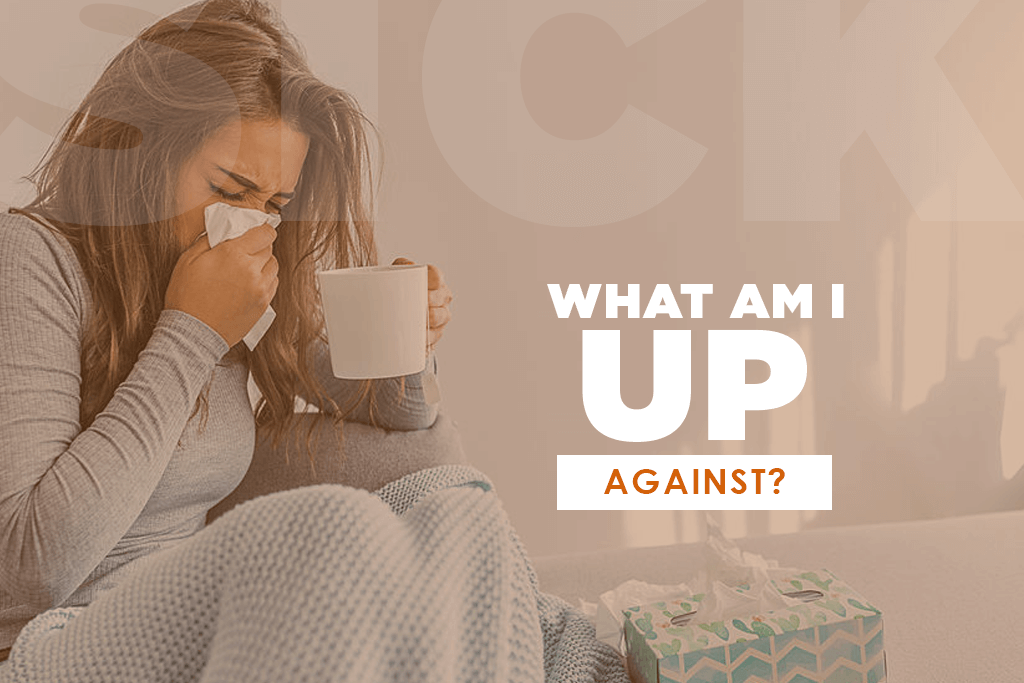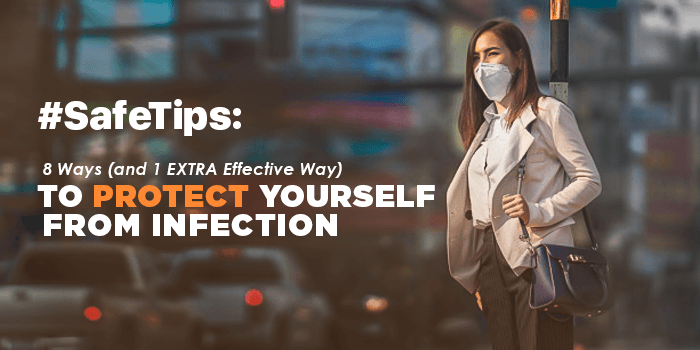With the world scrambling not to get infected by the 2019 Coronavirus outbreak, it’s important to keep yourself informed about the ways you can protect yourself and your family. Here are 8 #SafeTips (and 1 extra effective #SafeTips) you can use to keep yourself virus-free:
- Wear A Mask Over Your Face, Not Over Your Feelings!

The easiest way you can protect yourself is by wearing a facemask when you go outside or interact with people. Masks can protect you from sneezes or coughs from other people. While cloth or surgical facemasks can work, the N95 is the best mask to use, according to former health secretary Esperanza Cabral.[1] Don’t forget how to properly wear the mask in order to maximize its effectiveness. Make sure that the mask covers all of your mouth, chin and nose so that all susceptible parts from infection are properly protected. Pinch the lining over your nose so that it contours with your nose and covers the opening. If the strings on your mask only reaches your ears, twist the strings and hang it snugly around them so that the mask moves around less.
Contrary to popular belief, however, masks aren’t as effective in keeping infectious diseases out as people assume it to be. According to an article by the BBC, face masks are not as effective because the masks are too loose, don’t have air filters, and still leave eyes exposed to the air.[2] On a good note, facemasks still have the benefit of preventing hand-to-mouth transmissions by covering the mouth from the outside, protecting it even from your own hands. Make sure that you don’t pull down your mask to scratch that itch on your nose, as it defeats the purpose.
- Your Face Is Too Precious To Touch!

Masks can help limit the transmission of diseases because it protects your nose and your mouth. Including your eyes, your nose and your mouth are entry points that microbes can exploit to infect you. Your hands, on the other hand, can contain these harmful microbes. According to one study, people on average touch their face about 23 times in an hour.[3] It’s an involuntary behavior, for sure, but making a conscious effort not to touch your face can further decrease your chances of getting infected. As much as possible, stop your hands from touching your face.
- Do you remember what you last touched? Exactly! Wash those hands regularly!

If it’s so harmful to touch your face with your hands, why not just wear gloves so that your bare hands don’t come into contact with your face? Apart from those gloves also being susceptible from carrying those microbes, the World Health Organization comments that people who wear gloves are also less likely to wash their hands, which is more important to do at a time like this. Your hands, gloved or not, can come into contact with germs and microbes from any surface that you touch. Those microbes, however, can be easily eliminated by washing your hands properly with soap or hand sanitizers.[4] Take note of the word properly as merely running your hands through water is not enough. Put soap on your hands and scrub each and every nook, cranny and joint for about 20 seconds. Singing “Happy Birthday” in your head twice is long enough. Finally, rinse and dry them properly.
- No mask? No problem!

Because medical supplies are at a low, getting your hands on disposable facemasks or hand sanitizers can be hard to come by, and expensive. If you don’t have a mask, cover your nose and mouth, especially when coughing or sneezing. Keep in mind to sneeze or cough on tissue and to dispose of it immediately. If you don’t have tissue on hand, you can use your flexed elbow[5] or your shirtsleeve as you don’t touch these often. If you sneeze or cough on your hands, wash them right away with soap or hand sanitizer.
- Sometimes, it’s okay to keep some distance…

Densely populated areas like urban city centers are highly vulnerable to spreading infectious diseases like nCoV. Because large groups of people are frequently in contact with one another in places like cities, viruses can easily infect two or 10 or a 100 people in a single day. One of the ways you can avoid infection is by avoiding large crowds as often as possible. Stay indoors as much as possible. If you have to go out of the house, maintain a safe distance away from people, about a meter minimum, especially from people who are sneezing or coughing.[6]
- Wet Market? Hmm, Pass.

The 2019 nCoV originated from an open wet market in Wuhan, China. These wet markets were in contact with live animals, poorly regulated and very unhygienic. While most wet markets especially outside China are better regulated and vastly cleaner, it’s better to beware of live animals, animal products and surfaces that come in contact with them.[7]
- What Am I Up Against?

While all of these avoidance measures can prevent the spread of infection, interacting with people is almost impossible to avoid. Know what you’re fighting against so you’ll know what to avoid. Symptoms of nCoV include:
- Fever
- Cough
- Shortness of Breath
That small list covers a wide range of diseases, and not everyone with these symptoms are infected with nCoV. Regardless, stay vigilant with these symptoms and avoid people who are exhibiting them. If you’re familiar with the previous SARS and MERS outbreak, these also coming from a strain of Coronavirus, symptoms are similar.
- Feeling Sick? Don’t Panic and Get Checked!

If you’re exhibiting these symptoms yourself, don’t panic and get yourself checked. Unless you recently came from Wuhan, China specifically, came into contact with someone who did, or live in an area with a confirmed case of nCoV, it’s unlikely that you’ve been infected. Nevertheless, it’s best to be sure and take every precaution. In the interest of you and your family, you don’t want to spread infections. Avoid people if you’re sick yourself. In the small chance that you do get the virus, the health facility will take see to it that you are properly taken care of.
Finally, our extra-effective tip to protecting yourself:
- Strong Immune System is Life!

The best cure to any disease is having a strong enough immune system to fend these harmful microbes off. While nCoV is still without a cure and steadily spreading, it is not as deadly as the news makes you believe. A recent study held in Wuhan found the mortality rate to be higher than originally reported, but only figured 4.3%.[8] That’s 4 out of 100 people. Most of these deaths also come from elderly patients whose infection exacerbated their diseased condition. Staying healthy is your best bet for surviving any disease that comes your way! Getting regular sleep, exercise and eating healthy foods can improve your health in a major way. You can also take herbal food supplements to further strengthen your immune system.
This Coronavirus outbreak is just one of the many outbreaks that plagued the world since humankind began. With the improvement of medical technology that helps in prevention, care and recovery, the fatality rate of these worldwide epidemics are getting smaller and smaller. This means that with each passing year, the chances of anyone surviving from a viral outbreak is getting larger and larger. With proper care and preventative measures, you can survive any infectious outbreak!
References:
[1] https://www.cnnphilippines.com/news/2020/1/31/Cloth-masks-protection-novel-coronavirus.html
[2] https://www.theguardian.com/science/2020/jan/27/coronavirus-how-to-protect-yourself-from-infection
[3] Ibid.
[4] https://www.who.int/emergencies/diseases/novel-coronavirus-2019/advice-for-public
[5] Ibid.
[6] https://www.who.int/emergencies/diseases/novel-coronavirus-2019/advice-for-public
[7] ibid.
[8] https://jamanetwork.com/journals/jama/fullarticle/2761044?guestAccessKey=f61bd430-07d8-4b86-a749-bec05bfffb65&utm_source=For_The_Media&utm_medium=referral&utm_campaign=ftm_links&utm_content=tfl&utm_term=020720



